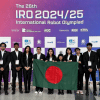Behind the journey of Team Atlas: the global award-winning robotics team from Bangladesh

Team Atlas, a robotics team from Bangladesh, recently ranked second worldwide at the World Robotics Championship 2023 among more than 300 teams. Previously, they also became Gold Medalists at the International Science & Innovation Fair 2022, and earned the award of Galactic Problem Solver in the NASA Space Apps Challenge 2021. The journey to placing themselves on the world map is an interesting one, so let's take an in-depth dive into the behind-the-scenes stories of the team.
The beginning
The initial idea behind starting the team was to unlock collaboration potential among robotics enthusiasts in Bangladesh and to break the institutional barriers towards fostering a community of like-minded individuals. Team Leader Sunny Jubayer shares, "The team, since it started, never limited itself to only those from a STEM background, but always stayed open to accrue members from all backgrounds, including commerce, liberal arts, and humanities." He explains that their focus has always been on building interest to learn and contribute as a team member - a mantra that has been followed since their inception.
The year 2016 marked a humble beginning for Team Atlas, with a lab equipped only with basic instruments such as a soldering station, microcontroller, Raspberry Pi, and motors. Sunny shares, "We started as a team of only 9 members, among which were 3 university students and 6 college students. Despite the differences in our age, it was an all-rounder team with dedicated individuals for hardware, electronics, card design, and programming." The team has grown since then and has grabbed awards in various local and international competitions - helping them sustain their work and remain motivated.

The journey of going global
After three years of preparation through research and developmental projects in their research lab in Banasree, Dhaka, and attending local tournaments, the first major international breakthrough for Team Atlas was achieved at the Singapore Autonomous Underwater Vehicle Challenge 2019, where they became a finalist. According to Mahtab Newaz, Team Administrator, this achievement helped develop their confidence to perform in global competitions.
Since then, they have attended many international competitions and have achieved numerous awards; in 2019, they also became runners-up at the World Robotics Championship. During the pandemic, they continued working on their rovers and other projects, with which they are now competing in more competitions. In 2021, they earned the award of Galactic Problem Solver in the NASA Space Apps Challenge. In 2022, they became Gold Medalists at the International Science & Innovation Fair in Indonesia. They also earned 4th place in the World Robotics Championship in 2022.
Team Atlas has also had their fair share of national achievements. In 2018, they were champions in two separate events: KUET Technival and DU Fab Fest. They also won the National Robotics Festival in 2017, the National Science and Technology Festival in 2021, and was even the winner of the Digital Bangladesh Award 2021.
Challenges on the way
"Our journey was, and still is, riddled with challenges," shares Shihab Ahmed, Team Management. According to him, the team often struggles to find most of the hardware they need. For instance, advanced sensors or single-board computers for Artificial Intelligence (AI) related projects are especially hard to find in Bangladesh. These accessories are essential for them to be able to compete at the world level against other countries when it comes to the latest technological advancements. Sunny elaborates on this by sharing that a few years back, the unavailability of hardware used to be worse. However, the scene is slowly changing as parts and materials have recently started to become more available locally.
The other major challenge Sunny shares is that most people fail to realise the potential of robotics in Bangladesh, which ends up being a notable barrier to the field's advancement. In the team's experience, even students as young as schoolgoers face barriers at home in pursuing robotics as a viable option for further studies or careers. The team also adds that large companies, especially those with the capacity to support their endeavours, often do not support them because there is limited branding, prestige, and understanding towards robotics in Bangladesh. By continuing to push the field of robotics in Bangladesh to global stages, Team Atlas hopes to address and combat such issues.

Future plans
Team Atlas is currently working on a number of projects and experiments in their research centre. "One of our first research projects focuses on soil, where we are using our own developed sensors for data collection and analysis," shares Sunny. The team plans on publishing their findings in peer-reviewed scientific journals in the future. Sunny adds that robotics research has immense potential, and in the future, the team wants to lead that revolution in Bangladesh.
Shihab explains that while the rest of the world is heavily investing in robotics, we still need to do it sufficiently. Team Atlas is trying to create a platform where the robotics community will unite to pursue their passion. He illustrates it with the example of factory automation technology, GPS navigation technology, and similar technological implementations, that need to be developed in Bangladesh.
Some team members wish to pursue a career in robotics and are working towards their own startup that focuses on the research and development of robotics. They are also working on projects under the government, such as the ICT and the iDEA Division. Team Atlas, as a whole, hopes to foster further growth in the robotics field of Bangladesh.

 For all latest news, follow The Daily Star's Google News channel.
For all latest news, follow The Daily Star's Google News channel. 








Comments